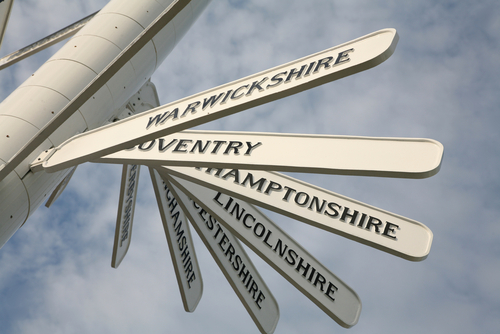Accounting in the North: An interview with EY's Bob Ward
In our latest deep dive, we look at how accountancy is growing in the North, the regional challenges faced, and how EY is part of this
In our latest deep dive, we look at how accountancy is growing in the North, the regional challenges faced, and how EY is part of this
Like many professions, there is often tendency to focus only on the work that is done in our capital city. New university graduates feel a pressure to move to London for work and there exists this idea that working and living in London is the most exciting and best-paid option. While building your career in the capital can certainly bring good opportunities, this shouldn’t rule out working elsewhere in the country.

As part of our effort to share insights into the accounting industry all over the UK, our reporter Lucy Skoulding spent time in Manchester hearing from EY’s Chairman of the North, Bob Ward.
Ward spent time living in Australia and South Africa growing up, moving back to the UK when he was 14 and attending university in Salford, Manchester. Following his studies, Ward stayed in the North to join Coopers & Lybrand which is now PwC and previously one of the Big Eight firms. After training and qualifying as an accountant then working a stint as a stockbroker, Ward returned to Coopers & Lybrand in the restructuring and insolvency team.
“I became an insolvency and restructuring specialist and ultimately made partner but in order to pursue that route, I got enticed to London. The deal was ‘come and be partner but work on bigger assignments and move down to London’, and that was in 2000. I relocated and spent another eight years at PwC, where I effectively forged my restructuring career and did lots of different types of assignments across different geographies and different sectors.”
Then Ward was approached by Ernst & Young, now EY for a role with them. While it was a tough decision as someone who had spent years at PwC, he took the plunge and joined the firm to focus on restructuring.
The deal was ‘come and be partner but work on bigger assignments and move down to London’
“The role was initially restructuring-focused and I ended up leading the London restructuring team, but started to take on some broader roles. I had a people role across transaction advisory and I had a broader markets role, which I quite enjoyed.”
Eventually Ward reached a point where he thought, ‘what next?’, still enjoying restructuring but yearning for a new challenge. When the opportunity came up at the end of 2016 to take on a North West senior partner and markets role across the North, Ward took the job and moved back to Manchester.
“My current role splits between about 60% market-facing with responsibility for the office, how we go to market, which accounts we focus on, and are we doing the right thing with our clients? That extends across the North, although I’ve got people I work very closely with in Leeds and Newcastle and Hull.
“Then I’m still sort of 30% – 40% a restructuring partner and do restructuring jobs, which sometimes works fine and sometimes doesn’t. Because the problem with restructuring jobs is that they’re typically full on and require a lot of your time.
 Navigating the London pressure
Navigating the London pressureThere is a lot of pressure in many professions to start your career in London, or at least work there for a proportion of it. This can put people in very difficult positions and clash with their personal lives if it means relocating.
When Ward was first asked to go to London, he said at first he was “really annoyed actually. I felt the firm had slightly rewritten the rules. The plan was for me to come through as a Manchester partner. That’s why I’d spent all the time developing the contacts I had in the areas.”
Now EY are striving to attract talent, whether new graduates or more experienced, to other areas of the country. Their promise now is that you very much do not have to go to London to have a successful and interesting career.
Ward added that at the time it was “hugely frustrating” but back then you would “just get on with it” if you wanted to follow the route to partner. This doesn’t happen so much now. People are prioritising in their lives differently, and businesses have had to adapt to this.
I think students still get a little bit brainwashed by what they’re told
Reflecting on why going to London was seen as such a necessity, a concept that remains to an extent but, as explained, has softened, Ward said: “There’s more opportunities in terms of places in London, not just with the Big Four, but for investment bankers and lawyers. As a newly qualified graduate or school leaver who wants to join an investment bank or private equity house, you’d certainly be looking at London.
“But the Big Four is no longer quite as skewed. I think students still get a little bit brainwashed by what they’re told.
“You would have to work a bit harder to persuade people who haven’t lived or been to university in the North to then go and live there. People who have been to the Universities of Liverpool, Manchester, Leeds, Durham, Hull, etc have an affinity to the North and might be more likely to stay and work there.
 Are attitudes towards the partner model changing?
Are attitudes towards the partner model changing?Ward explained that people’s career journeys have also altered significantly since he began working in the profession.
There used to be “a well-trodden path of people coming through to partnership in the Big Four – you get your qualifications; get lots of different experiences; work out where you’re going to specialise; spend some time abroad, for example a secondment, come back, become a partner.”
Now he feels like people are not choosing to “stay with one firm all the way through, so there’s going to be lots of chopping and changing. I don’t think a model where people join a firm at 21 or 22 and do all of the stuff I just outlined, and then become an equity partner at 35, is sustainable. I don’t think people want that.”
Those wanting to make partner don’t necessarily have to go to London anymore.
I don’t think a model where people join a firm at 21 or 22 and then become an equity partner at 35 is sustainable
“If you’ve worked and trained to develop your career in the North West and you want to be a North West partner, then it’s absolutely right thing for you to be a North West partner – because it works for you personally and professionally.”
“People have much more of a choice now when it comes to the career-related decisions they have to make. “I’m not saying it’s right or wrong; it’s actually quite hard. If I look at my partner tracker pipeline at the people who are likely to come through to partner in the next three years it’s not as strong as I’d like it to be.”
“So I’m already shouting to other parts of the country saying, ‘What does yours look like?’ What’s good is that we can encourage people to come up North if there is less opportunity where they currently are in terms of making partner. We’re trying to do a bit more of that.”
 Growth in the regions
Growth in the regionsEY has continued its growth significantly outside of London in recent years, with 42 percent of all its new hires being outside of the capital.
At the start of Ward’s career, regional business was on the decline. He said: “It became a London-centric, sector-centric, sort of model. And the regional business sort of got paired back.”
But change was on the horizon for the industry, Ward marking the 2006 to 2016 decade as one of significant evolution, particularly for EY.
“The strategy for the last three years, hence my excitement about being here, is to reverse the London-centric focus. We’ve made a lot of investment with a lot of people, a lot of partners coming through, internal admits, external admits. We have focused on trying to have a full service offering across our main market, including the Midlands, the North, and Scotland.”
For Ward, opportunity really does lie in the regions. “You get some fantastic large private companies in the North West that are real opportunities for us to grow because we get to service them locally.
“We’re seeing growth in that private middle-market area that is exceeding the growth in the main largest sector of driven accounts. It isn’t just a North thing – it’s Scotland, the Midlands, Thames Valley in the South, and London too.
EY now has five offices across the North of England, including more than 1,600 employees in that region, with a particular presence in Manchester, Newcastle, and Leeds.
Ward said: “I think the North has benefited from very strong cities. Manchester has been a great, almost flagship, model for working in the region. That comes with some challenges though, because if you look at the North West as a region, not all the devolution plans have been as successful as the Greater Manchester Combined Authority.”
Cumbria, for instance, has been much more challenging. Yorkshire and the North East are not joined up particularly well. “There needs to be a combined strategy, covering education and skills, transport and digital. That would be very powerful.
“I think we’re on that journey, as is evident by the amount of foreign direct investment that’s coming here. You go out to Manchester Airport, you see the big warehouse hubs, like Amazon have got a big distribution centre there, and you’ve got companies opening up in the centre of town. It’s very vibrant. It’s also got quite a strong digital and technology investment area, probably second behind London in terms of the amount of investment growth that we’re seeing.”
I don’t think the North-South divide will close any time soon and devolution is not working very well.
This said, great poverty remains in the region. There’s is a clear imbalance between the haves and have-nots. While this is the case in London too, Ward pointed out that London is an entire city, connected, whereas the Greater Manchester Authority is made up of city and town.
“There isn’t a vibrant city in Bolton, there isn’t a vibrant city in Blackburn. I think that’s an issue.”
Ward hopes the North can become more connected in the future. “Manchester’s probably always going to be your hub for the North West – though Liverpool might argue. The North West is growing faster than most other regions, albeit on a smaller number than some. I don’t think the North-South divide will close any time soon and devolution is not working very well. It’s more a redistribution of existing monies and prioritisation rather than regions receiving more money and choosing where they spend it.
“While I have so much time for Andy Burnham, mayors don’t actually have that much power yet. Their ability to pull levers and make decisions are still fairly limited.”
 Brexit and beyond
Brexit and beyondWard hopes the devolution model will change somewhat. There needs to be clear plans to invest in the North at the same time as the Midlands, London, and the South.
“What needs to happen in the North from an infrastructure perspective is not going to be finished until 2035. That’s really too long. I think there needs to be a combined digital strategy with high-speed networks, enabling people to work remotely more effectively, at the same time as trying to fix road and rail.
When it comes to Brexit, Ward said “business as usual really is the mantra. People are getting bored with it. Foreign Direct Investment (FDI) has definitely slowed down, although that’s not just a North thing. This slowdown has massive knock-on consequences. That’s my biggest fear around Brexit, irrespective of what the outcome is.
“No matter what my or anyone’s personal views are, it is what it is now. We just need to get on with it.”